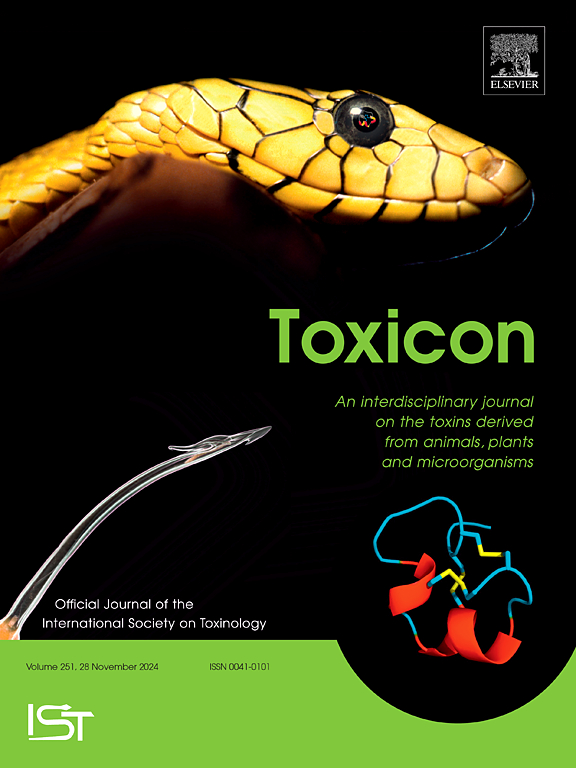利用腺相关vírus-based基因治疗实现对蓖麻毒素的重组中和抗体的长期表达
IF 2.6
4区 医学
Q2 PHARMACOLOGY & PHARMACY
引用次数: 0
摘要
蓖麻毒素是一种剧毒的植物蛋白,没有特殊的解毒剂。目前对蓖麻毒素中毒的预防性和紧急治疗受到需要事先接种疫苗和抗体药物在流通中的半衰期短的限制。为了解决这些限制,我们开发了一种新的免疫治疗策略,使用腺相关病毒(AAV)基因转移来延长全身血清中蓖麻毒素免疫球蛋白的水平。本研究通过单次给药rAAV来传递蛋白免疫疗法,并研究其对蓖麻毒素致死剂量小鼠的保护作用。结果显示,在蓖麻毒素暴露前3天单次给药rAAV可有效保护小鼠免受致死剂量的蓖麻毒素的伤害。值得注意的是,这种保护作用在注射AAV后持续长达90天,显示出长期疗效。总的来说,我们的研究结果表明,raav介导的方法在早期和长期预防蓖麻毒素中毒方面都有希望。该系统良好的安全性及其在开发新型蓖麻毒素抗体疗法方面的潜力使其成为该领域值得进一步探索和开发的候选药物。本文章由计算机程序翻译,如有差异,请以英文原文为准。

The use of adeno-associated vírus-based gene therapy to achieve long-term expression of recombinant neutralizing antibody against ricin
Ricin is a highly toxic plant protein for which there are no specific antidotes. Current prophylactic and emergency treatments for ricin intoxication are limited by the need for prior vaccination and the short half-life of antibody drugs in the circulation. To address these limitations, we developed a novel immunotherapeutic strategy using adeno-associated virus (AAV) gene transfer to achieve prolonged systemic serum levels of immunoglobulins to ricin. In this study, a single administration of rAAV was used to deliver protein immunotherapeutics, and its efficacy in protecting mice against lethal doses of ricin was investigated. The results revealed that the single administration of rAAV three days prior to ricin exposure effectively protected mice from lethal doses of ricin. Remarkably, this protection was sustained for up to 90 days after AAV injection, demonstrating long-term efficacy. Overall, our findings suggest that the rAAV-mediated approach holds promise for both early and long-term prevention of ricin intoxication. The favorable safety profile of this system and its potential for the development of novel ricin antibody therapeutics make it a noteworthy candidate for further exploration and development in the field.
求助全文
通过发布文献求助,成功后即可免费获取论文全文。
去求助
来源期刊

Toxicon
医学-毒理学
CiteScore
4.80
自引率
10.70%
发文量
358
审稿时长
68 days
期刊介绍:
Toxicon has an open access mirror Toxicon: X, sharing the same aims and scope, editorial team, submission system and rigorous peer review. An introductory offer Toxicon: X - full waiver of the Open Access fee.
Toxicon''s "aims and scope" are to publish:
-articles containing the results of original research on problems related to toxins derived from animals, plants and microorganisms
-papers on novel findings related to the chemical, pharmacological, toxicological, and immunological properties of natural toxins
-molecular biological studies of toxins and other genes from poisonous and venomous organisms that advance understanding of the role or function of toxins
-clinical observations on poisoning and envenoming where a new therapeutic principle has been proposed or a decidedly superior clinical result has been obtained.
-material on the use of toxins as tools in studying biological processes and material on subjects related to venom and antivenom problems.
-articles on the translational application of toxins, for example as drugs and insecticides
-epidemiological studies on envenoming or poisoning, so long as they highlight a previously unrecognised medical problem or provide insight into the prevention or medical treatment of envenoming or poisoning. Retrospective surveys of hospital records, especially those lacking species identification, will not be considered for publication. Properly designed prospective community-based surveys are strongly encouraged.
-articles describing well-known activities of venoms, such as antibacterial, anticancer, and analgesic activities of arachnid venoms, without any attempt to define the mechanism of action or purify the active component, will not be considered for publication in Toxicon.
-review articles on problems related to toxinology.
To encourage the exchange of ideas, sections of the journal may be devoted to Short Communications, Letters to the Editor and activities of the affiliated societies.
 求助内容:
求助内容: 应助结果提醒方式:
应助结果提醒方式:


